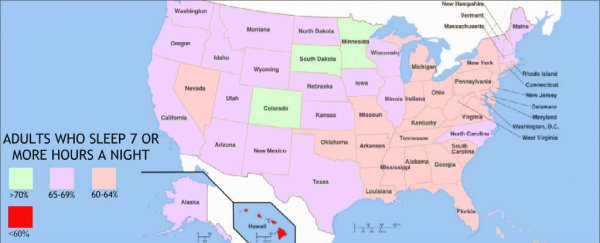An investigation into the sleeping habits of Americans has revealed that just over half of the population is getting more than the recommended 7 hours of sleep a night, and where you live appears to have a big influence on how much you're getting.
The Centres for Disease Control and Prevention (CDC) report, which polled 444,306 Americans, reveals that about 70 percent of adults living in Minnesota, South Dakota, and Colorado are getting more than 7 hours sleep a night, while in Hawaii, less than 60 percent of the population is managing to get enough.
"State-based estimates of healthy sleep duration prevalence ranged from 56.1 percent in Hawaii to 71.6 percent in South Dakota," says the report. "Geographic clustering of the lowest prevalence of healthy sleep duration was observed in the southeastern United States and in states along the Appalachian Mountains, and the highest prevalence was observed in the Great Plains states."
Overall, the investigation found that 65.2 percent of respondents reported getting the recommended amount of sleep each night.
But where you live isn't the only factor that can influence your sleeping habits - according to the report, your education level, marital status, and race also appear to be at play. And that's important, because if you're consistently getting less than 7 hours a night, you're putting yourself at a higher risk of developing obesity, diabetes, high blood pressure, heart disease, and stroke.
The report found that the prevalence of healthy sleep duration was highest among respondents with a college degree or higher (71.5 percent) and 67.4 percent of married respondents said they were getting 7 hours or more, compared to divorced, widowed, or separated respondents (55.7 percent), and single respondents (62.3 percent).
Also of note is the fact that white people are getting far more sleep than anyone else in the US. Susan Rinkunas reports for NY Mag:
"When the responses were broken down by race, they found that non-Hispanic whites had the highest rate of healthy sleep duration, at 66.8 percent. Close to 66 percent of Hispanics got 7-plus hours, as did 62.5 percent of Asians and 59.6 percent of Native Americans. Black people were at 54.2 percent, and multiracial people were at the bottom, with 53.6 percent."
While exact causal relationships are outside of the scope of the report, there are some pretty telling correlations that could explain the trends mapped out above.
Your health can play a big role in the likelihood of you getting a good amount of sleep - lead researcher on the report, epidemiologist Anne Wheaton, points out that states in the Southeast do worse with sleep, and also have a poor track record on certain health disorders. "If you look at the state map of obesity and frequent mental distress, you'll see similar hot spots," she told Angus Chen at NPR. "These are things that can affect sleep."
It's a bit of a 'chicken and the egg' problem - bad health can result in bad sleep, and bad sleep can result in bad health.
When it comes to other factors, research will need to be done to confirm any links, but scientists suggest that the more fortunate and less stressed out you are, the sounder you will sleep, while lower population density appears to correlate to more hours of shut-eye.
"What is likely going on is probably explained by demographic composition. Densely populated neighbourhoods might have more noise and light. African-Americans compared to whites are more likely to live in those neighbourhoods," Lauren Hale, a family and preventative medicine professor at Stony Brook University, who was not involved in the study, told NPR.
"There are concerns about racism, not being able to feed one's family, relatives being incarcerated," she added. "One needs to feel safe. If you don't have that internal feeling of security whether financial, physical, or emotional, it will be harder to fall asleep."
As to WTF is going on in Hawaii, no one's ready to make any guesses right now, with Wheaton telling NPR she has no hypotheses at this stage.
But the main takeaway from the report is that 1 in 3 Americans aren't getting enough sleep, and that's a problem. Fortunately, regardless of your current situation, there are plenty of things you can do to correct your sleeping patterns, or, you know, you could just fake it.
The full report is available online here.
